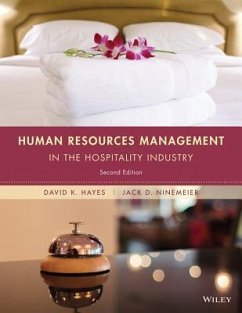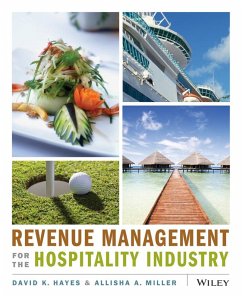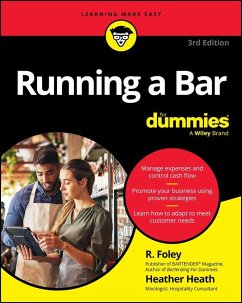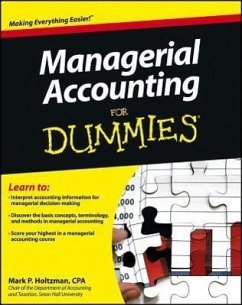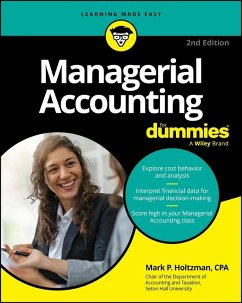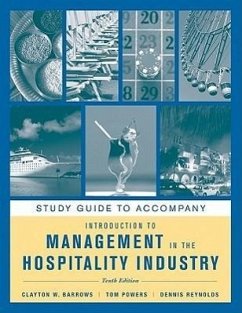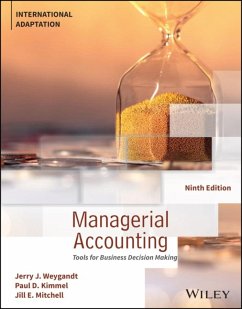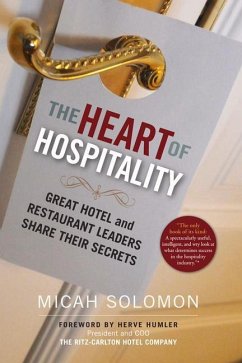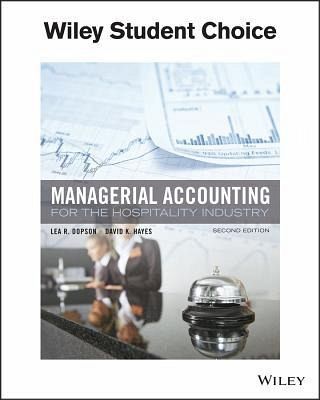
Lea R. Dopson (California State Polytechnic University, Pomona, CalDavid K. Hayes (Michigan Lansing)
Broschiertes Buch
Managerial Accounting for the Hospitality Industry
Versandkostenfrei!
Versandfertig in 2-4 Wochen

PAYBACK Punkte
50 °P sammeln!




Revised edition of the author's Managerial accounting for the hospitality industry, c2009.
Lea R. Dopson is Dean and James A. Collins Distinguished Chair of The Collins College of Hospitality Management at Cal Poly Pomona. Previously, she was Department Chair of Hospitality and Tourism Management at the University of North Texas, and she taught at Cal Poly Pomona, the University of Houston, and Texas Tech University. Dr. Dopson holds an Ed.D. from the University of Houston, and an MBA and BS in Restaurant, Hotel, and Institutional Management from Texas Tech University. Her areas of teaching include hos-pitality managerial accounting, hospitality finance, and food and beverage cost controls. She has published in a variety of journals and has presented her research at numerous conferences. She has also co-authored with David Hayes, Food and Beverage Cost Control, published by John Wiley & Sons, which is presently in its sixth edition. Dr. Dopson has an ardent interest in international education, as is demonstrated by her creation of a MS in International Sustainable Tourism joint degree between the University of North Texas and Centro Agronómico Tropical de Investigación y Enseñanza (CATIE), Costa Rica. Also, Dr. Dopson lived 9 months in Zimbabwe, Africa, developing a degree program in interna-tional hospitality and tourism. In addition to her academic career, she has held various unit and corporate hospitality management positions with Texas Tech Foodservice, Sheraton Hotels, and Bristol Hotels. David K. Hayes earned his Ph.D. in Education from Purdue University, as well as MS and BS degrees in Hotel and Restaurant Management. He held faculty positions at Purdue University, Texas Tech University, and the University of Houston. At Texas Tech University, he founded the Restaurant Hotel and Institutional Management (RHIM) program and served as Chair of the Department of Nutrition, Education and Restaurant/Hotel Management. Dr. Hayes was Vice President of the Educational Institute (E.I.) of the American Hotel & Lodging Association (AH&LA) and was responsible for the develop-ment of industry training programs utilizing advanced technology delivery systems. An industry practitioner as well as academician, he was the Owner/General Manager of the full-service Clarion Hotel and Conference Center in Lansing, Michigan. An accomplished author, his scholarly articles have appeared in The Cornell Quarterly. He has written 12 books, including texts translated into Spanish, Japanese, Chinese, Portuguese, and Croatian. He is now a full-time author who divides his professional writing and industry advising activities between offices in Okemos, Michigan and Gulfport, Mississippi.
Produktdetails
- Verlag: John Wiley & Sons Inc
- 2 ed
- Seitenzahl: 528
- Erscheinungstermin: 1. Dezember 2016
- Englisch
- Abmessung: 250mm x 202mm x 26mm
- Gewicht: 1060g
- ISBN-13: 9781119299653
- ISBN-10: 1119299659
- Artikelnr.: 68043763
Herstellerkennzeichnung
Libri GmbH
Europaallee 1
36244 Bad Hersfeld
gpsr@libri.de
Für dieses Produkt wurde noch keine Bewertung abgegeben. Wir würden uns sehr freuen, wenn du die erste Bewertung schreibst!
Eine Bewertung schreiben
Eine Bewertung schreiben
Andere Kunden interessierten sich für


